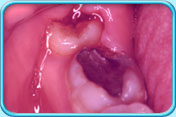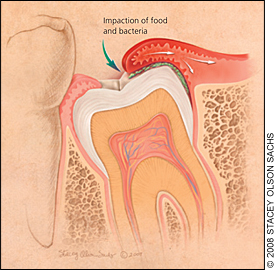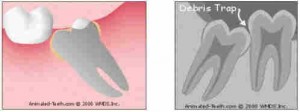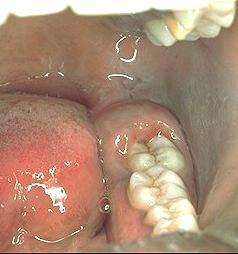
Pericoronitis © Tooth Club
Ever experienced pain in the wisdom teeth area? Wisdom tooth pain or specifically known as pericoronitis, is the inflammation of the flaps of gum tissue covering a partially erupted tooth (operculum) associated particularly with the third molars (wisdom teeth). Wisdom tooth pericoronitis may be acute (rapid onset) or chronic (of long duration) in nature.
Causes of wisdom tooth pericoronitis

© AAFP.org
- Incomplete eruption of a wisdom tooth produces a large space between the gum flap and the tooth, making it an ideal location for food debris to collect and allow bacteria to grow. It can easily become infected, causing the tissue to be extremely inflamed and painful. There is constant inflammation in the area and the dental pericoronitis could be chronic if no acute symptoms are present.
- Frequently, an opposing upper tooth may cause ulcers on the swollen operculum by biting on the gum flap.
- Wisdom tooth infection can occur when the tooth is partially erupted and there is poor oral hygiene. Bacteria can cause decay of the tooth and lead to inflammation of the gum tissue surrounding the tooth.

© Ramaclinic.com
- Impacted wisdom tooth, whereby the wisdom tooth could not erupt properly into the mouth due to obstructions, for example blockage from the adjacent teeth, which can lead to impaction of food and plaque accumulation under the gum flap.
- Pericoronitis is caused by a mixed infection and the various bacteria found in dental plaque, particularly anaerobes, can be the cause of the disease.
Signs and symptoms of wisdom tooth pericoronitis
This disease is a common problem associated with young adults as the wisdom teeth start erupting. The wisdom teeth usually start appearing in the mouth from the age of 17 to 21 though they vary from each person. Some may not have wisdom teeth at all.
The signs and symptoms usually present in wisdom tooth pericoronitis are:

© GoldBamboo
- Soreness and tenderness around the wisdom tooth area in the back of the mouth.
- Redness and swelling of the gums in the affected area.
- Pain is severe and spontaneous, and is often aggravated by closing the mouth. In some severe cases, pain may be worsened by swallowing and there may be difficulty in opening or closing the mouth to allow examination of the area.
- Pain can spread to throat and ear.
- Swelling of the cheek.
- Bad taste in the mouth or bad breath.
- Occasionally pericoronitis may be accompanied by fever, swelling in the neck and body discomfort.
- Enlarged lymph nodes
- In severe cases, pus may flow out from the infected area.
- Wisdom tooth pericoronitis is often a recurrent problem if the main cause is not removed.
Wisdom tooth pericoronitis treatment and management
There are several considerations in managing wisdom tooth pericoronitis which include the severity of the case, whether it is a recurrent problem and the possible complications involved.
- Initial treatment is aimed at resolving the symptoms. Food debris in the infected area will be removed from under the gum flap by gentle flushing with warm water or dilute hydrogen peroxide. Any dead tissues will be removed under anesthetic agent applied to the tissue.
- Your dentist will then instruct you to rest at home, keep the mouth clean using warm saltwater mouthwash and drink fluids to avoid dehydration.
- Your dentist may prescribe you antibiotics, particularly when there is fever and enlarged lymph nodes. Penicillin or penicillin and metronidazole will be given and should be taken according to instructions.
- Another appointment may be made for further irrigation of the affected area and once the symptoms have resolved, further assessment is done. The position of the affected tooth, its relationship to the second molar and any complicating factors will be determined by using X-rays.
- If X-rays show that the third molar is badly misplaced, impacted or decayed, it should be extracted after inflammation has subsided.
- If the tooth is to be retained, the operculum is removed, especially when an upper tooth is biting on the flap and to allow proper cleaning of the area.
Complications of wisdom tooth pericoronitis

© Buzzle.com
Wisdom tooth pericoronitis will resolve after treatment from your dentist. Both treated and untreated acute pericoronitis may become chronic if the operculum remains. In severe cases, pus may track behind from the operculum to cause serious infection in the face and there can be extensive bone loss around the partially erupted tooth and its neighbors.
When to contact your dentist
Contact your dentist when you show the following symptoms:
- Extreme pain at the back of the mouth
- Redness and swelling in the wisdom tooth area
- Swelling of the cheek
Pingback: How to Make Your Own Mouthwash Part1 | Intelligent Dental
Pingback: 10 Ways to Stop Bad Breath | Intelligent Dental
Pingback: Causes of Sore Gums | Intelligent Dental
Pingback: Wisdom Tooth Nerve Pain | Intelligent Dental
Pingback: How to Treat Teething Symptoms With Homeopathy | Intelligent Dental